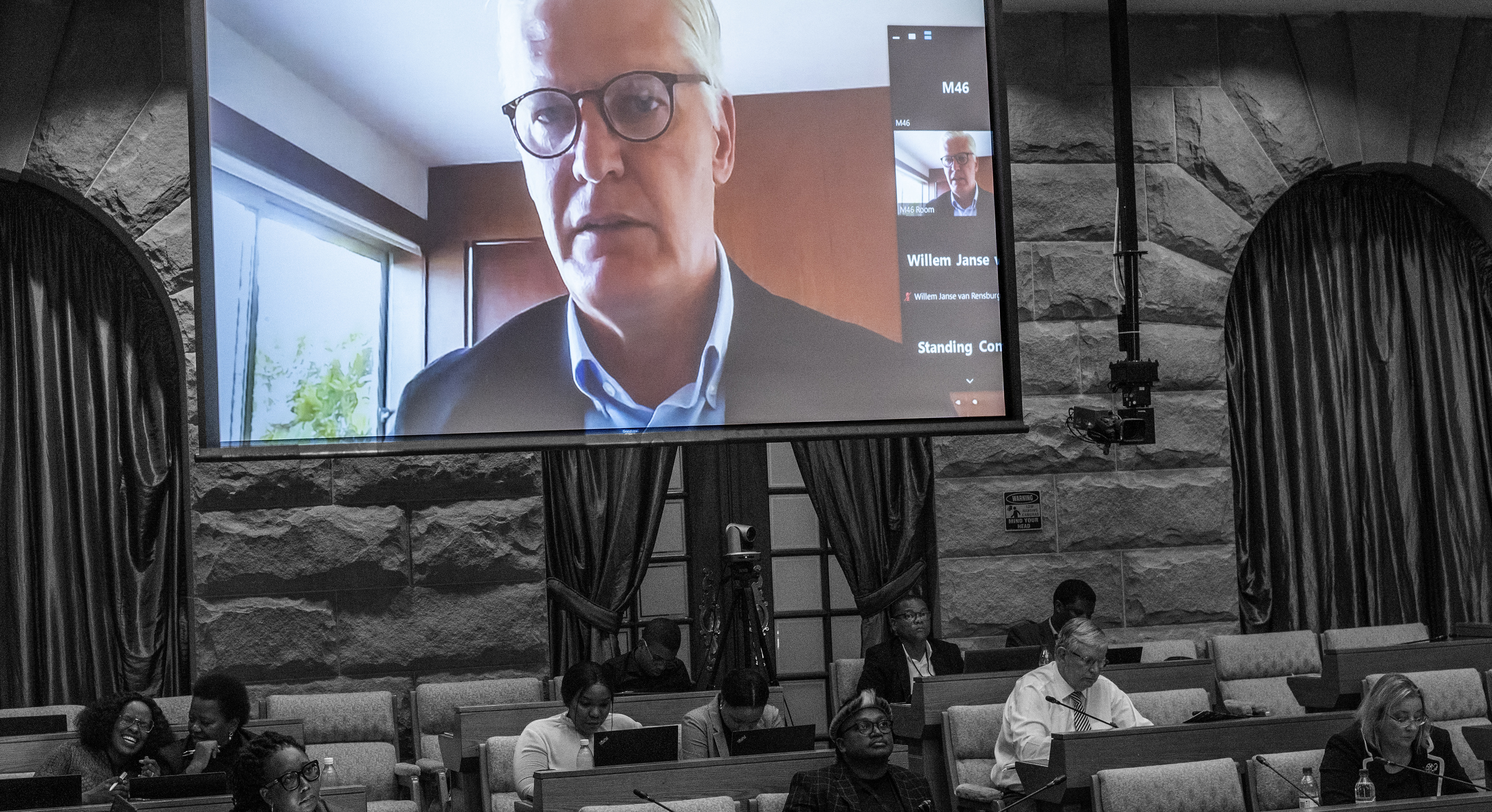Tuesday, 12 September was the second time Jap Burger failed to appear before the Standing Committee on Public Accounts (Scopa) after being asked to do so. In June, his boss, national police commissioner Lieutenant-General Fannie Masemola told MPs he had instructed the brigadier to be there, but didn’t see him at the hearing — an incorrect account, according to a letter Burger wrote.
When the Scopa chairperson, IFP MP Mkhuleko Hlengwa, again wrote to Masemola in late August to request that he ensure Burger’s presence before MPs on Tuesday, Burger had retired. Daily Maverick has confirmed that no one had told Scopa of the brigadier’s retirement at the end of June.
But earlier that month, when he was still in the SAPS, Burger fired off a missive to National Assembly Speaker Nosiviwe Mapisa-Nqakula and two parliamentary ethics officials, saying that Parliament could not publicly discuss Eskom crime cartel matters because of national security and complaining about Scopa MPs’ conduct.
“Eskom is regarded as a National Security concern, is a National Key Point, and is part of the critical infrastructure of the country and therefore requires security competence by those involved in such matters... None of the concerns raised in Scopa were, according to my knowledge, referred to any of these oversight committees that have appropriate procedures to deal with National Security matters such as the Joint Standing Committee on Intelligence,” Burger wrote in the letter dated 19 June.
“Investigations into criminality such as organised crime and corruption relating to matters of national security are classified in nature and not are open [sic] to public or political scrutiny until it is [sic] presented in court.”
Burger wrote that he had told Masemola he would not appear before Scopa, whose role it was “to consider matters of a financial nature and conducted itself with direct public exposure…
“The national commissioner, however, appears not to have communicated my position to the Scopa meeting ... but alluded to Scopa that he does not know where I am and that I was scared to appear before Scopa.”
‘Conjecture and ridicule’
Because that meeting resulted “in opinionated statements, conjecture and ridicule”, Burger said the MPs’ conduct was in possible violation of their mandate and the parliamentary code of conduct. Scopa’s conduct and proceedings needed to be “corrected”.
“No comment,” said Masemola when Daily Maverick asked him about Burger’s claim that he had misrepresented the situation at the Scopa meeting in June.
Burger wrote that “an integrated national security resolve of Eskom” had to be activated, and the executive held to account as the power utility was “not served or protected by the security sector”.
Never mind the billions of rands siphoned from the state-owned power utility at the heart of State Capture, which today cannot sustain a secure electricity supply. On Tuesday, Stage 5 and Stage 6 rotational power cuts were announced amid unplanned breakdowns, leaving South Africans without power for up to 10 hours a day.
Scopa members have seen this letter, which effectively seeks to curtail Parliament’s constitutional oversight mandate over any organ of state — and the power to “require any person or institution to report” to it under section 56 of the Constitution. Parliament has the right to determine “its business with due regard to representative and participatory democracy, accountability, transparency and public involvement”, according to section 57 of the Constitution.
Parliament’s Rule 167 allows a committee to “summon any person to appear before it to give evidence before it, to give evidence on oath or affirmation, or to produce documents…”
Parliament’s roles as the legislative sphere of the state and the constitutional oversight and accountability structure are accepted in South Africa’s constitutional democracy. It’s rare to hold committee meetings in secret, given the constitutional imperative of open parliamentary processes; what is shared behind closed doors stays behind closed doors.
On Tuesday, ANC MPs on Scopa seemed less interested in the possibility of Masemola having misled them, or in actually getting Burger to appear before them.
“We are pursuing an ordinary member of the public now,” exclaimed ANC MP Bheki Hadebe after it emerged Burger was on pension after 40 years in the police. Earlier, he argued that if a meeting with Burger was still necessary, “we can have the meeting as a closed session for us to receive whatever information…”
DA MPs Alf Lees and Benedicta van Minnen cautioned against what they called the veil of secrecy that would come with referring to the Joint Standing Committee on Intelligence the probe into widespread systemic organised crime syndicates made by ex-Eskom CEO André de Ruyter in a televised interview in late February.
Parliamentary legal services would be approached on what to do about Burger’s refusal to appear, according to the wrap by the acting committee chairperson, ANC MP Sakhumzi Somyo, who added that MPs would discuss, assess and write a report for the House on the Scopa probe into the Eskom cartel corruption claims.
Read more Daily Maverick coverage about the hearings here, here, here and here.
Much was made about the report that De Ruyter commissioned being an “intelligence report”. It emerged the matter has been referred to the Inspector-General of Intelligence, and also discussed in the statutory national intelligence coordinating structure, Nicoc.
Burger’s securocrat talk may well find traction with hawks in government. The registration and vetting of religious and non-government organisations, defined so broadly as to include even knitting clubs, has been reintroduced in the General Intelligence Laws Amendment Bill.
Similar provisions were removed from the General Laws Amendment Bill in October 2022 following a public outcry in an unsuccessful attempt to stave off greylisting.
But Parliament has a firm constitutional mandate of holding to account, responsiveness and openness. DM





